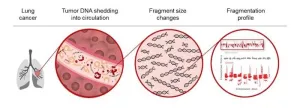(Press-News.org) Using artificial intelligence technology to identify patterns of DNA fragments associated with lung cancer, researchers from the Johns Hopkins Kimmel Cancer Center and other institutions have developed and validated a liquid biopsy that may help identify lung cancer earlier.
In a prospective study published June 3 in Cancer Discovery, the team demonstrated that artificial intelligence technology could identify people more likely to have lung cancer based on DNA fragment patterns in the blood. The study enrolled about 1,000 participants with and without cancer who met the criteria for traditional lung cancer screening with low-dose computed tomography (CT). Individuals were recruited to participate at 47 centers in 23 U.S. states. By helping to identify patients most at risk and who would benefit from follow-up CT screening, this new blood test could potentially boost lung cancer screening and reduce death rates, according to computer modeling by the team.
“We have a simple blood test that could be done in a doctor’s office that would tell patients whether they have potential signs of lung cancer and should get a follow-up CT scan,” says the study’s corresponding author, Victor E. Velculescu, M.D., Ph.D., professor of oncology and co-director of the Cancer Genetics and Epigenetics program at the Johns Hopkins Kimmel Cancer Center.Lung cancer is the deadliest cancer in the United States, according to the National Cancer Institute, and worldwide, according to the World Health Organization. Yearly screening with CT scans in high-risk patients can help detect lung cancers early, when they are most treatable, and help avert lung cancer deaths. Screening is recommended by the U.S. Preventive Services Task Force for 15 million people nationally who are between ages 50 and 80 and have a smoking history, yet only about 6%–10% of eligible individuals are screened each year. People may be reticent to follow through on screening, Velculescu explains, due to the time it takes to arrange and go to an appointment, and the low doses of radiation they are exposed to from the scan.
To help overcome some of these hurdles, Velculescu and his colleagues developed a test over the past five years that uses artificial intelligence to detect patterns of DNA fragments found in patients with lung cancer. It takes advantage of differences in how DNA is packaged in normal and cancer cells. DNA is neatly and consistently folded up in healthy cells, almost like a rolled-up ball of yarn, but DNA in cancer cells is more disorganized. When both types of cells die, fragments of DNA end up in the blood. The DNA fragments in patients with cancer tend to be more chaotic and irregular than the DNA fragments found in individuals who do not have cancer.
The team trained artificial intelligence software to identify the specific patterns of DNA fragments seen in the blood of 576 people with or without lung cancer. Then, they verified that the method worked in a second group of 382 people with and without cancer. Based on their analyses, the test has a negative predictive value of 99.8%, meaning that only 2 in 1,000 individuals tested may be missed and have lung cancer.
The group’s computer simulations showed that if the test boosted the rate of lung cancer screening to 50% within five years, it could quadruple the number of lung cancers detected and increase the proportion of cancers detected early — when they are most treatable — by about 10%. That could prevent about 14,000 cancer deaths over five years.
“The test is inexpensive and could be done at a very large scale,” Velculescu says. “We believe it will make lung cancer screening more accessible and help many more people get screened. This will lead to more cancers being detected and treated early.”
The test is currently available through DELFI Diagnostics for use as a laboratory-based test under the Clinical Laboratory Improvement Amendments. However, the team plans to seek approval from the U.S. Food and Drug Administration for lung cancer screening. Velculescu colleagues also plan to study whether a similar approach could be used to detect other types of cancer.
Robert B. Scharpf of Johns Hopkins co-authored the study. Additional co-authors were from the Cleveland Clinic, DELFI Diagnostics, Medicus Economics LLC, Miami Cancer Institute, the Pan American Center for Oncology, Washington University, Centura Health, Vanderbilt Health, Stratevi, Massachusetts General Hospital, the Medical University of South Carolina, the Department of Veterans Affairs, the Perelman School of Medicine at the University of Pennsylvania, New York University Langone Health, Allegheny Health Network and Memorial Sloan Kettering Cancer Center.
The work was supported in part by DELFI Diagnostics, the Dr. Miriam and Sheldon G. Adelson Medical Research Foundation, Stand Up To Cancer-LUNGevity-American Lung Association Lung Cancer Interception Dream Team Translational Research Grant, Stand Up To Cancer-DCS International Translational Cancer Research Dream Team Grant, the Gray Foundation, The Honorable Tina Brozman Foundation, the Commonwealth Foundation, the Cole Foundation and the National Institutes of Health.
Velculescu and Scharpf are inventors on patent applications submitted by The Johns Hopkins University related to cell-free DNA for cancer detection that have been licensed to DELFI Diagnostics, LabCorp, Qiagen, Sysmex, Agios, Genzyme, Esoterix, Ventana and ManaT Bio. Velculescu divested his equity in Personal Genome Diagnostics (PGDx) to LabCorp in February 2022. Velculescu is a founder of DELFI Diagnostics, serves on the board of directors, and owns DELFI Diagnostics stock. Scharpf is a founder and consultant of DELFI Diagnostics and owns DELFI Diagnostics stock. Velculescu, Scharpf and Johns Hopkins receive royalties and fees from the company. The Johns Hopkins University also owns equity in DELFI Diagnostics. Velculescu is an adviser to Viron Therapeutics and Epitope. These relationships are managed by Johns Hopkins in accordance with its conflict-of-interest policies.
END
Artificial intelligence blood test provides a reliable way to identify lung cancer
2024-06-06
ELSE PRESS RELEASES FROM THIS DATE:
The ethical matrix: it's not just smart; it's the smart thing to do
2024-06-06
Artificial Intelligence (AI) is the talk of the town, but far too often expediency has been the driver, not responsible innovation. The NYC Media Lab (NYCML) at NYU Tandon School of Engineering and Bertelsmann launched their 4th challenge this month, this time aimed at mentoring teams with projects that use AI to responsibly advance their fields.
The 2024 collaboration, The Ethical Matrix Challenge: Forging New AI Frontiers in Media, Communications, Education, and Healthcare, focuses on ethical AI and its power to have a real-world influence. The four selected teams have projects that can responsibly revolutionize the way ...
Study: Young athletes at risk for elevated blood pressure rates, future cardiovascular complications
2024-06-06
A substantial portion of young athletes are at risk of hypertension, according to a study presented at the American College of Cardiology’s Care of the Athletic Heart conference, taking place on June 6-8 in Washington.
High blood pressure, also known as hypertension, occurs in 47% of adults in the U.S., according to CardioSmart.org. Over time, hypertension weakens the heart, blood vessels and kidneys, paving the way for potential stroke or heart attack. Often referred to as the “silent killer,” high blood pressure is a leading risk factor for heart disease and early death.
The 2017 ACC/American Heart Association Guideline for the Prevention, ...
Mpox continues to circulate at low numbers among gay and bisexual men who have sex with men
2024-06-06
While mpox cases have sharply declined since the 2022 global outbreak, they continue to occur in the U.S. among gay and bisexual men who have sex with men (GBMSM), according to a UCLA-led study from EMERGEncy ID NET, a multisite surveillance network funded by the Centers for Disease Control and Prevention (CDC).
Though no cases were found in women, children or the unhoused, vigilance and vaccination remain important, the researchers write.
The findings will be published June 6 in the CDC’s Morbidity and Mortality Weekly Report.
Mpox, formerly known as monkeypox, ...
How the cell cycle orchestra plays an unexpected new tune
2024-06-06
How the Cell Cycle Orchestra Plays an Unexpected New Tune
UCSF scientists discover that multiciliated cells adapt the well-known process of cell division to make hundreds of cilia.
The awe-inspiring process of cell division can turn a fertilized egg into a baby – or a cancerous cell into a malignant tumor. With so much at stake, nature keeps it tightly controlled in a process called the cell cycle that scientists thought they thoroughly understood.
But now it turns out there was more to know. Scientists ...
Exotic black holes could be a byproduct of dark matter
2024-06-06
For every kilogram of matter that we can see — from the computer on your desk to distant stars and galaxies — there are 5 kilograms of invisible matter that suffuse our surroundings. This “dark matter” is a mysterious entity that evades all forms of direct observation yet makes its presence felt through its invisible pull on visible objects.
Fifty years ago, physicist Stephen Hawking offered one idea for what dark matter might be: a population of black holes, which might have formed very soon after the Big Bang. Such “primordial” black holes would not have been the goliaths that we detect today, but ...
El Centro Regional Medical Center provides financial and operational updates
2024-06-06
El Centro Regional Medical Center (ECRMC), an affiliate of UC San Diego Health, today announced several financial and operational updates, demonstrating significant progress toward stabilizing and strengthening a critical health services asset in the Imperial Valley.
“Our goal is simple — to ensure that the people of El Centro and the broader Imperial Valley have long-term access to health care services,” said Pablo Velez, RN, PhD, chief executive officer, ECRMC. “Over the last year, the amazing team of dedicated physicians and staff at ECRMC have worked tirelessly in partnership with UC San Diego ...
ESMO Gynaecological Cancers Congress 2024: Event Announcement
2024-06-06
Lugano, Switzerland, 6 June 2024 – The ESMO Gynaecological Cancers Congress 2024 will be held in Florence, Italy, between 20-22 June, hosting international experts who will present and discuss the latest developments in the biology, diagnosis and therapy of gynaecological tumours. The management of rare gynaecological malignancies will be among the key areas covered in the scientific programme, available online.
The congress can be joined either in person or via the online platform.
Programme ...
Dana-Farber Cancer Institute partners with Massachusetts firefighters to address cancer risks
2024-06-06
BOSTON – Dana-Farber Cancer Institute is proud to announce the launch of the Direct Connect Partnership with Massachusetts Firefighters, marking a crucial step in addressing the heightened cancer risk faced by firefighters.
Dana-Farber’s Direct Connect program partners with employers who want to support their workforce across the spectrum of oncology needs and provides guided access to world-renowned expertise from cancer care specialists. Direct Connect has more than ...
Tepper School study offers a better way to make AI fairer for everyone
2024-06-06
n a new paper, researchers from Carnegie Mellon University and Stevens Institute of Technology show a new way of thinking about the fair impacts of AI decisions. They draw on a well-established tradition known as social welfare optimization, which aims to make decisions fairer by focusing on the overall benefits and harms to individuals. This method can be used to evaluate the industry standard assessment tools for AI fairness, which look at approval rates across protected groups.
"In assessing fairness, the AI community tries to ensure equitable treatment for groups that differ in economic level, race, ethnic background, gender, and other categories,” ...
People with autism turn to ChatGPT for advice on workplace issues
2024-06-06
A new Carnegie Mellon University study shows that many people with autism embrace ChatGPT and similar artificial intelligence tools for help and advice as they confront problems in their workplaces.
But the research team, led by the School of Computer Science's Andrew Begel, also found that such systems sometimes dispense questionable advice. And controversy remains within the autism community as to whether this use of chatbots is even a good idea.
"What we found is there are people with autism who are already using ChatGPT to ask questions that we think ChatGPT is partly well-suited and partly poorly suited for," said Begel, an associate professor ...


